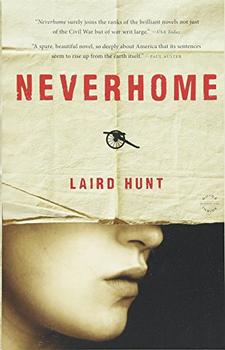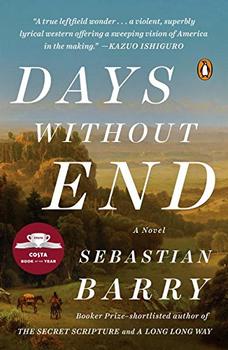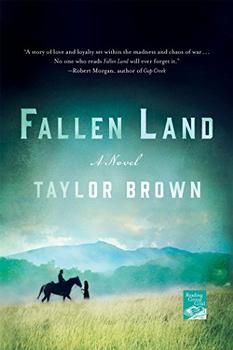Summary | Excerpt | Reading Guide | Reviews | Beyond the book | Read-Alikes | Genres & Themes | Author Bio

A Novel
by Laird HuntLaird Hunt's latest novel, Neverhome, is the story of Ash Thompson, a new recruit in the Union Army at the book's start. In the opening chapters, readers come to learn that Ash is actually Constance, who has left her farm and husband to enlist as a soldier in the American Civil War. We follow her as she learns to fight and kill – and as she discovers exactly how duplicitous men can be. Through episodic adventures that are reminiscent of those endured by Odysseus, Constance eventually leaves the fighting and begins her long journey back home.
The premise is a compelling one and is based on historical fact: there are approximately 400 documented cases of women fighting as men during this particularly bloody conflict. Hunt expertly incorporates history into the narrative, bringing to light little known facts (see 'Beyond the Book') about what hardship these women endured as soldiers and the trials they experienced as a result of their deception.
The highlight of the book is unquestionably Hunt's writing. The action is narrated in the first person by Constance, and the author has given her a unique and beautiful voice. After she kills her first Confederate soldier one night while on picket duty, she tells her audience:
Now there I sat. I wanted to take up the dead man's head and cradle it but I did not do that and knew that that kind of a thought was another thing I was going to have to learn to kill. Some of them on relief teased me a little as I sat there my minute but I didn't pay them any mind. They hadn't killed anyone that morning. When the sun was up sufficient I saw that the dead man's eyes were blue.
Employing a narrator who speaks in vernacular can be a challenge for any writer. If done well, that voice can add a unique style and convey a more immediate sense of time and atmosphere in a way that third-person stories can't. It's often difficult for an author to maintain that style from start to finish. Hunt, however, doesn't miss a beat; Constance's voice is consistently true. Although the use of such colloquialism adds a note of authenticity to Constance's account, it also makes it difficult to read from time to time and could be a barrier for some readers.
Despite its distinctive heroine making this novel a stand-out, I felt that in the first half, not enough was made of the fact that the main character was a female, and the account seemed to lack any hint of a feminine perspective. There was also a coldness to her that made it difficult to relate to what she was experiencing; Constance is relaying past actions so some emotional distance is to be expected, but I thought overall the tone was too remote. It was also never made clear why she felt compelled to enlist in the first place. Her past is gradually revealed over the course of the novel, and I think this is meant to have some bearing on the choice she made, but the connection really wasn't apparent.
Those concerns aside, Neverhome will likely find a wide audience among those who read historical fiction, and its accuracy is sure to please history purists and aficionados of Civil War fiction. In Constance, Hunt has created an inimitable and unforgettable heroine who will have broad appeal, and her story will likely touch many.
![]() This review was originally published in The BookBrowse Review in September 2014, and has been updated for the
June 2015 edition.
Click here to go to this issue.
This review was originally published in The BookBrowse Review in September 2014, and has been updated for the
June 2015 edition.
Click here to go to this issue.

If you liked Neverhome, try these:

by Sebastian Barry
Published 2017
Moving from the plains of Wyoming to Tennessee, Sebastian Barry's latest work is a masterpiece of atmosphere and language. An intensely poignant story of two men and the makeshift family they create with a young Sioux girl, Winona, Days Without End is a fresh and haunting portrait of the most fateful years in American history and is a novel never ...

by Taylor Brown
Published 2017
Searching for a home in a ravaged landscape, two star-crossed lovers flee a ruthless band of bounty hunters, from the Blue Ridge Mountains of North Carolina to Sherman's March through Georgia in the final years of the Civil War.
Your guide toexceptional books
BookBrowse seeks out and recommends the best in contemporary fiction and nonfiction—books that not only engage and entertain but also deepen our understanding of ourselves and the world around us.